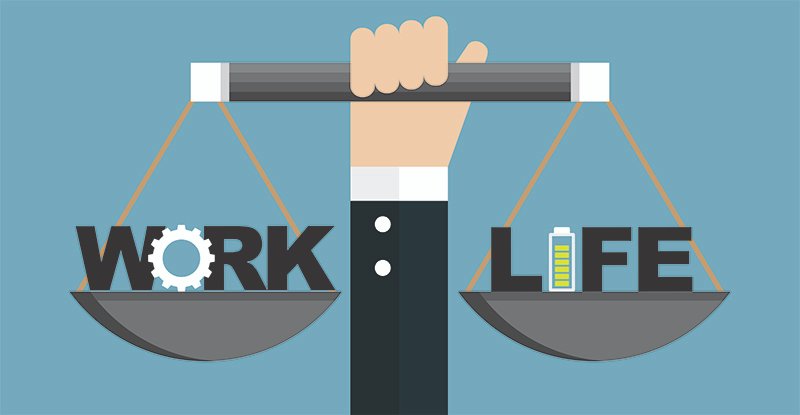Even some days ago, an excellent work-life balance meant leaving the office on time. For some, it was about spending more time with their respective families, while others grabbed the opportunity to get together with friends or go to a movie after office. Companies are gradually offering employees to work from home one or more days each week as one of the Ways to Improve Work-Life Balance.
Then the COVID-19 pandemic & consequent lockdowns changed the nature of work-life. Even after the lockdown periods, many office workers are working from home full-time, & are realizing that the lines between work life & home life are easily getting blurred. While the need for daily commutes is gone, it has been replaced by many other challenges, like extended work hours.
Ways to Improve Work-Life Balance

1. Recognize Productivity Peaks
So long as the work is getting done, the time of the day shouldn’t matter. While some people are at their productive & creative best in the early morning, others go for a slower start & can best apply themselves in the afternoon or evening.
Employees should pay attention to their strengths & allocate their workloads around their most productive periods to decrease procrastination & the frustration caused by a lack of efficiency.
2. Identify When To Say “No”
Recognizing when to say no can be one of the hardest soft skills for any professional to learn & use. But it’s a significant part of setting boundaries. To start, you need to first evaluate the usual demands of your day & learn to state & prioritize what you have on your to-do list.
Suppose a colleague has to leave early & asking you to have some of his tasks. You can inform politely but firmly that you have your own works to do; you can’t let your work suffer because you choose to do a favor.
Suppose a friend asks for a loan; you can inform them why you can’t spare that amount right now as you have some other plans & responsibilities to fulfill with that money.
3. Take Small Breaks
One of the best Ways to Improve Work-Life Balance is to take small breaks. These small ten or fifteen minutes breaks can help you to improve focus, reduce stress, make you feel engaged, Make your work feel not boring & many more.
After working for one or two hours, get out of your seat. Take a walk or grab a coffee, chat with some colleagues if they are available, scroll through social media feeds, or ring your partner or friends for a quick chat. After getting back to work, you will feel more focused, relaxed & less stressed.
4. Practice Self-Compassion
One of the most vital Tips To Maintain Work-Life Balance is to let pass the tendency of perfectionism. The perfectionism approach caused some success during school days & the beginning of the career. But the stress caused by it mounts up over time. The tension in our organism & emotional resources intensifies as our responsibilities grow.
It’s vital to identify that life isn’t always a walk in the park. Everyone struggles, & you will not always get it the way you wanted or planned. Recognizing this truth will help you shift toward a more compassionate grow-&-learn approach toward work & life. This can help to establish a feeling of balance.
5. Set Boundaries So You Can Truly Unwind
Set & state your work hours to your colleagues & clients so that you have confirmed boundaries. This should include when you are working & when you are unavailable to respond.
One simple way to do this is to set an autoresponder to alert people who send you emails that you are currently offline. This message can also inform them when you will respond. This eradicates the pressure of checking work emails. Set up a system for key members to contact you in time of an actual emergency, so you don’t miss something critical.
6. Establish A No Work At Home Policy
Frequently, most people carry their work home to meet deadlines. The incapability to leave work at the workplace is a vital issue caused by the excess workload faced by employees. Working during off-hours hampers the amount of rest needed by the human body.
Moreover, it damages the social life of individuals, which is essential for a healthy mindset. People can ensure this doesn’t happen by establishing a “No Work at Home” policy. Your home is where you go for rest, to complete other duties & responsibilities. You must save all the job-related work for your workplace & enjoy the time with your family.
7. Maintain A Flexible Work Schedule
Striking a healthy balance between work & life is impossible if there’s personal time missing after leaving work. In those cases, maintaining a flexible work schedule is very significant. Flexibility in work timings allows people to devote equal focus on their personal & social aspects of life, like their professional life.
Moreover, a schedule like that can positively affect an individual’s efficiency at work. It also acts as an alternate stress management method.
8. Proper Time Management
Time management is vital when it is about having the right work-life balance.
Most people tend to overlook this matter. Consequently, they got overwhelmed by unfinished work at the end of the day and needed more time for themselves and their family. So, one must ensure they have a proper practice of time management for maximized efficiency & quality off-time.
Why Do People Struggle To Strike A Work-Life Balance?
Recently, a survey conducted by a famous e-commerce company revealed that 60% of people struggle to maintain a work-life balance, while 40% claims they work long hours.
Reasons people struggle to get the balance right are:
- A false idea that being seen to work hard will help get a promotion or pay hike.
- A disinclination to rest until everything on their to-do list is checked off.
- Unfeasible workloads without investing extra hours.
- Significant home changes like having children, caring for a sick family member, or relocation.
Luckily, there are several Ways to Improve Work-Life Balance that can help one prevent chances of stress & burnout.
FAQs
Q: My company is forcing me to work beyond work hours; what should I do?
A: No company can force an employee to work beyond official hours. If it is over time, they have to compensate you. Again, working beyond office hours is an employee’s personal choice & forcing it goes against labor laws.
Q: Even after applying Ways to Improve Work-Life Balance, I can’t seem to achieve that because of target pressure & deadlines; what to do?
A: Deadlines & targets are inevitable pressures in professional life. That’s where time management comes to play. Plan your schedule accordingly.
Q: Can Increased responsibilities at work cause Work-Life Imbalance?
A: About half of millennial & Gen X people complained of additional work responsibilities as a chief cause of poor work-life balance.










